#i’ve been rewatching the 1955 show and there are so many scenes that i want to draw
Explore tagged Tumblr posts
Text

#the scarlet pimpernel#sir percy blakeney#chauvelin#percy/chauvelin#i’ve been rewatching the 1955 show and there are so many scenes that i want to draw#i have a list~#i changed a lot from this though lol i liked the poses#and i needed that size difference ✨#art#fanart#digital art#my art
74 notes
·
View notes
Text
Quantum Leap - Season Three Review
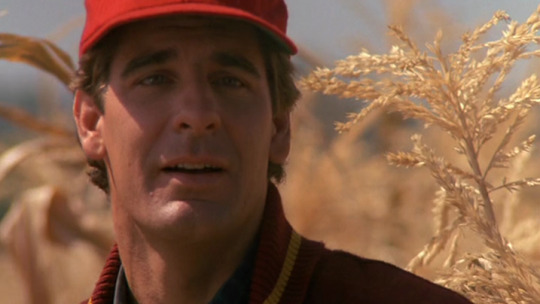
"I always do the right thing, Al. And where does it get me?"
Season three is when the formula started to wear thin a bit... and I got a little tired of "Oh, boy," even though Scott Bakula valiantly did his level best to make it sound different every single time. Al hitting his hand link also got a little old. It was also pretty obvious by this point that God has a sick sense of humor. The way Sam is dumped into ridiculous and/or dangerous situations with no knowledge of what is going on is like an ongoing practical joke. Why would God leap Sam into a magic box being pierced by swords, or just in time to sprinkle talc on a naked guy's underwear?
What works
Just like season two, the best episodes of season three are the premiere and the finale. In fact, the premiere is considered to be the best episode of the series, because Sam finally got to leap home. Sort of.
3.1 "The Leap Home, Part 1 (November 25, 1969)": How many of us would give nearly everything for a chance to go back in time and fix what went wrong in our own lives? It's tragic that when Sam leaped into himself at sixteen, he longed to save everyone in his family, but had to face the fact that it was not what God sent him there to do.
In a way, "The Leap Home" paralleled "M.I.A.", where Al refused to believe Ziggy's projections because he wanted the leap to be about saving his marriage to Beth. Here, Sam also refused to believe what Al was telling him because he was certain he was there to save his brother from dying in Vietnam, his father from dying of lung cancer, and even that he could keep his little sister Katie from ruining her life by marrying an abusive man. It's so easy for the audience to put themselves in Sam's shoes. I confess that I've often fantasized about going back in time somehow so that I could find a way to save my sister's life.
But no, you really can't go home again. With the possible exception of Al dancing with Beth in "M.I.A.," "The Leap Home" gave us the strongest scene in the series as Sam told his little sister Katie the truth about time travel and the bad stuff that was coming, and tried to prove it by singing his favorite song that hadn't been written yet. (A beautiful vocal by Scott Bakula, and by the way, "Imagine" is, coincidentally, my favorite song of all time, too.) Katie's face as she slowly realized that she'd never heard the song before and that it meant their brother Tom would die was genuinely heartbreaking, and Sam was forced to say that he was making it all up. This scene was made even more poignant, if that's possible, by Al almost wordlessly telling Sam not to share with Katie what happened to John Lennon. Honestly, I'm dripping tears just writing about it.

In the scenes that followed, Sam for the first time expressed his anger at what God was forcing him to do, to save other people but not the people that Sam himself loved. Al, who had also lost his chance to fix his life with time travel, was the one to remind Sam that God also gave him an amazing gift: the chance to spend Thanksgiving with his family one more time.
Scott Bakula played both Sam and Sam's father. That was okay, but it felt too much like a gimmick. I wonder if maybe some of the scenes might have worked better if I hadn't been distracted by Bakula playing two roles?
That's a nitpick, though. This is an excellent, emotionally resonant episode.
3.2 "The Leap Home, Part 2 (April 7, 1970)": Part two was also terrific. It felt like God was rewarding Sam for his sacrifice in part one by allowing him to save Tom's life. Andrea Thompson (Babylon 5) gave a good performance as dynamic reporter Maggie Dawson, who died for her Pulitzer. It made me think about whether or not it would be worth dying to create something that would live forever.
But I was unhappy that the unsuccessful mission was all about rescuing Al from his POW prison back in 1970. It felt like the writers were rubbing in the fact that Sam and Al couldn't use time travel to change their own lives... except that Sam actually could, this time. Why was Sam rewarded but Al punished? (Maybe I'm taking this too personally.)
3.6 "Miss Deep South (June 7, 1958)": I dislike pretty much everything about beauty pageants, but couldn't help loving this episode. Maybe I really liked the feminist slant, that Sam had to perform well in the pageant so that the young woman he'd leaped into could become a doctor and save a whole lot of lives — or maybe it was that he was also there to save another young woman from making an epically bad choice in life, like his sister Katie.
Okay, okay, it was probably Scott Bakula singing "Great Balls of Fire" while dressed like Carmen Miranda.
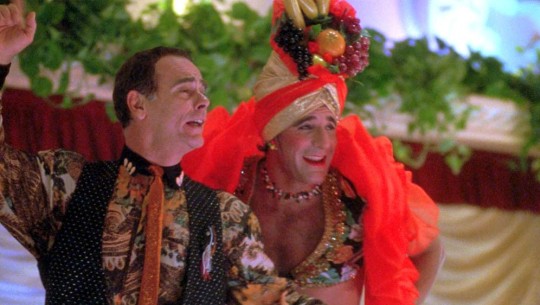
3.12 "8 1/2 Months (November 15, 1955)": Another excellent episode where Scott Bakula played a woman, this time an unmarried, pregnant sixteen-year-old girl. I particularly liked the emphasis on how helpless an underage pregnant girl was and how few choices she had back in the fifties. I also want to mention again what a strong actor Scott Bakula is. He's a masculine-looking guy, but he can wear women's clothing, even flowery maternity clothes, and I'm still focused on his performance instead of what he's wearing.
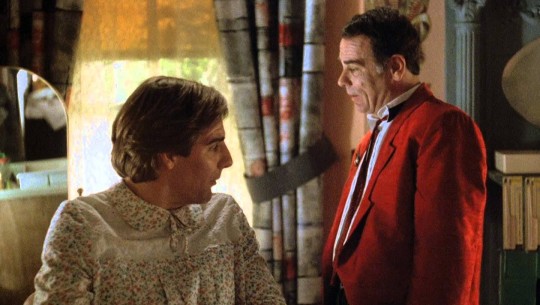
3.13 "Future Boy (October 6, 1957)": Sam leaped in to help Moe, the star of a children's TV show about time travel. Moe constructed a faux time machine in his own basement, and his adult daughter Irene believed that Moe was losing his marbles and wanted to have him committed. Touchingly, Moe built the machine because what he wanted more than anything was to go back in time and be a better husband and father. I don't know whether or not it was intentional, but there was some ambiguity in this Moe situation, since it was pretty clear to me that Moe really had lost touch with reality and should have been hospitalized. But it was still touching that Sam was able to bring Moe and Irene back together as family.
3.22 "Shock Theater (October 3, 1954)": As I've mentioned before, many Quantum Leap episodes feel like homages to specific movies. Here, it was One Flew Over the Cuckoo's Nest, as Sam was subjected to shock treatment against his will, which made him dissociate into various personalities. The best part was that all of those personalities were the real people that Sam leaped into, and that this time, Sam wasn't faking it -- he actually was his leapees: Tom Stratton, Jesse Tyler, Samantha Stormer, Jimmy, Kid Cody.
Nearly every episode of Quantum Leap puts Sam in some sort of danger, but we usually feel that he'll be okay in the end. In this one, it felt like things were spiraling out of control as Sam suffered abuse and was in genuine peril. In the end, Sam was forced to ask for the shock treatment that he dreaded, and he and Al somehow wound up leaping together, leaving us with a pretty serious and unusual cliffhanger.
Okay, there were a couple of problems with this one. Al rapping to teach Scott Lawrence's character to read made me uncomfortable. It was also hard not to wonder what happened to Sam's unfortunate leapee after the treatment, and how unfair that whole thing was to him.
Honorable mention
3.17 "Glitter Rock (April 12, 1974)": It's always fun when an episode features Scott Bakula singing, and for some reason, I absolutely loved the technicolor pseudo-Kiss makeup. But what the hell was Al wearing? A decorative stop sign? Wouldn't that be dangerous if he were walking down a road somewhere?

3.18 "A Hunting Will We Go (June 18, 1976)": It's hard to pull off this much slapstick in a single episode and do it well, but I thought they did: this episode was pretty darned funny. Good job by Scott Bakula as well as Jane Sibbett, who gave a vibrant performance; I always saw her as David Schwimmer's bland ex-wife on Friends, and didn't realize she was capable of stuff like this. I also appreciated the homage to the famous Clark Gable/Claudette Colbert hitchhiking scene from It Happened One Night.
What doesn't work
There are a few weak episodes, but this one's awfulness stood out from the crowd:
3.5 "The Boogieman (October 31, 1964)": This truly idiotic and poorly written episode is about a dream Sam had, while unconscious, of mysterious murders at a Halloween spook house. It included a replica of Al as the devil trying to stop Sam from fixing things while leaping — possibly Dean Stockwell's poorest performance of the series — and a teenage Stephen King with his dog Cujo.
Bits and pieces:
-- Famous people: Jack Kerouac, and as mentioned above, Stephen King.
-- Notable actors: C.C.H. Pounder, Kurt Fuller, and Peter Noone from Herman's Hermits. And Olivia Burnett, who did such a terrific job playing Sam's little sister Katie, also played another little girl named Susan in season two's "Another Mother."
-- Here's a question for those of you better at this online app stuff. Is Quantum Leap available for free at nbc.com (with commercials)? If it is, what did they do about the music replacement issue?
To conclude
I thought season three was good, but not quite as good as season two. And in fact, rewatching season three drove home for me that as a series, Quantum Leap was episodic, not serial. Honestly, I'd forgotten. But as my mother used to say, it is what it is.
On to season four.
Billie Doux loves good television and spends way too much time writing about it.
#Quantum Leap#Sam Beckett#Al Calavicci#Scott Bakula#Dean Stockwell#Quantum Leap Reviews#Doux Reviews#TV Reviews#something from the archive
15 notes
·
View notes
Text
Quantum Leap - Season One Review
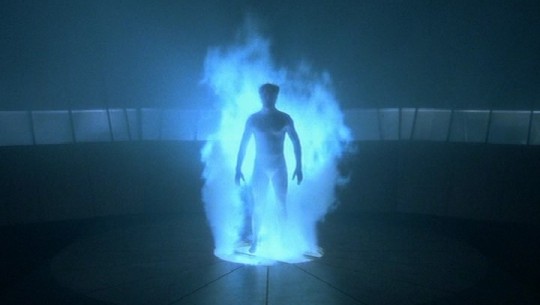
"Oh, boy."
Quantum Leap began as a mid-season replacement in early 1989, ran for five seasons (1989-1993), and made a television star out of Scott Bakula. While it was running, it was one of my two favorite shows (the other was Star Trek: The Next Generation). There wasn't much good science fiction on television back then. Actually, there wasn't much sci-fi on television at all, unlike today's sci-fi-rich television environment.
What happens
A brilliant scientist named Sam Beckett (Scott Bakula) invents time travel. Pressured to produce results or lose funding, he tries it on himself — and wakes up in 1956 in someone else's body. With the help of his Quantum Leap Project partner Al (Dean Stockwell) who visits Sam in the form of a neurological hologram, Sam discovers that he must correct whatever it was that "went wrong" in the original timeline before he can leap out again. It is theorized by Ziggy, the artificial intelligence back at the Project, that if Sam can't make the appropriate correction in each leap, he'll be stuck in that person's body forever.
What works
There is so much to love about Quantum Leap. Fortunately, the two best things about the show are the main characters, Sam and Al, and the actors who played them. I've always thought that Sam Beckett is a dream role for an actor, and Scott Bakula was more than up to the challenge of playing a new character in a new situation every week. Okay, not exactly a new character, but he still had to play Sam's interpretation of that character, which added some acting layers while still preserving the integrity of Sam himself as a character.
Yes, Sam Beckett is just too perfect. A genius with six doctorates, his massive intellect made him capable of stepping into nearly anyone's life. What helped make Sam less perfect was that the Quantum Leap process made "swiss cheese" out of his memory. His partial amnesia also helped disconnect him from his old life, making it easier to immerse himself in the lives of the people he leaped into, an excellent plot device.
And then there is Al, who is also brilliant and multi-talented, and whatever Sam can't do while living someone else's life, like fly a plane or speak Italian, Al can step in and help. Al is also the king of double entendres and references to scoring with women, and under other circumstances, I would have found such a character repulsive. But Dean Stockwell is just so lovable in this part. He made it easy to see the humanity and goodness inside Al, right from the start. And Bakula and Stockwell played so well off each other. Even though Sam and Al were totally different people, they were believable as close friends.
The basic premise of the series is great, too; it's a fascinating framework for a time travel series. The only real limitation is that Sam couldn't travel to the future or to a time earlier than 1953. Setting episodes in the fifties, sixties or seventies made Quantum Leap all about the nostalgia, though. Gender roles, period music, historical events woven into the story like the east coast blackout and the streaking fad in the early seventies, you name it.
And then there were the clothes. I have little interest in fashion, but I love the costumes on this show. Scott Bakula looked so comfortable and natural, so right in those period outfits. Sometimes they were yummy; occasionally they were hilarious. What I enjoyed just as much was Al showing up in bizarre futuristic outfits in outrageous colors, which fortunately never became fashionable in real life. Like Bakula with the period clothes, Dean Stockwell simply made that wardrobe work. Al is a colorful character, and his wardrobe matches his personality.
What doesn't work
There isn't much I don't like about Quantum Leap. Maybe it would have been interesting if they hadn't been limited to Sam's lifespan, and the United States (and yes, brief spoiler, they do get around that occasionally in future episodes). And yes, it tends toward the procedural, since most of the episodes are Leaps of the Week, but hey, it was the nineties.
One thing did leap :) out at me during this rewatch — the show's tendency to lecture. In this abbreviated first season, we got "The Color of Truth," the first time that Sam leaped into the body of someone who wasn't a white guy like himself. Instead of just being a person of color with an important life experience that Sam had to figure out and change, "The Color of Truth" is a sixty-minute lecture on the evils of racial segregation in 1955 Alabama. Not that there's anything wrong with the topic: it was a huge and important part of the recent past, and the episode was both well-intentioned and well done. But preachiness can be a turnoff, and this wasn't the only time it happened.
Another thing I didn't like was that every episode ended in a cliffhanger as Sam leaped into his next challenge, in what always appeared to be dire circumstances. Yes, I get it, cliffhangers help bring the audience back. But I would have been a lot happier if they had simply ended each episode with Sam leaping out, who knows where.
The music replacement controversy
When Quantum Leap was initially released on DVD way back when, Universal decided not to buy the rights to a number of the songs featured on the series simply because it was prohibitively expensive. Changing the music changed the series, though, and many fans were livid about it. The worst offenders were the season two episodes "M.I.A." and "Good Morning, Peoria." (I'll talk more about why fans were upset in my review of season two.)
After some research, I can report that Amazon and Netflix fixed this serious problem; the original music is intact. (I'm writing this review in December 2016, and I live in the U.S.) Unfortunately, Netflix decided to stop carrying Quantum Leap as of January 1, 2017, when I hadn't quite finished my rewatch, so I had to move to Hulu. And unfortunately, Hulu does not feature the original music. I have no idea what is going on with the music in the DVD sets. If you plan to buy Quantum Leap on DVD, you might want to find out about the music replacement situation before purchasing, if it matters to you.
Important episodes
1.1/1.2 "Genesis (September 13, 1956)": This is a decent two-part pilot. The brave test pilots and their long suffering wives waiting at home kept reminding me of the 1983 movie The Right Stuff, which might have been their intention. (In fact, many Quantum Leap episodes remind me of specific movies.) Maybe it shouldn't have been a two-parter, though, because honestly, while Sam's "wife" was doing the laundry, I got a little bored.
This pilot does mention the possibility that Sam's leaping is being directed by God. You'd think God would have the power to fix things Herself without having to use Sam, but okay. Maybe God employs other people like Sam, too.
1.6 "Double Identity (November 8, 1965)": Best episode of the season, and an obvious tribute to The Godfather. The wedding scene where Sam had to sing and Al gave Sam the Italian lyrics to "Volare" was funny, and kept getting funnier as Sam channeled his inner lounge lizard and really got into it. In fact, it went on so long that you'd think it would stop being funny, but it didn't.
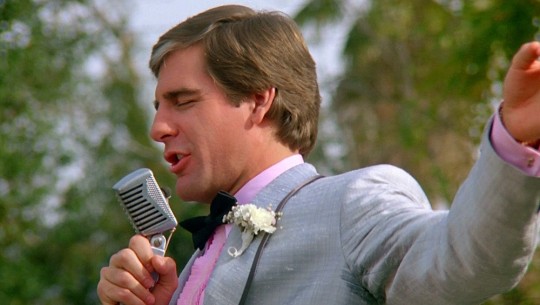
(This might be a good time to mention that Scott Bakula has a beautiful, professional singing voice that they often featured in the series.)
Later, during a life and death situation and wearing hair clips and shaving cream, Sam had to converse in Al-prompted Italian. Bakula spoke the lines Sam didn't understand as if he were reciting poetry. And the ending with the thousand watt hair dryer in Buffalo causing the east coast blackout of 1965 was practically perfect.
1.9 "Play It Again, Seymour (April 14, 1953)": A very Sam Spade sort of episode with bits of Casablanca, with Sam in the body of a private eye who looked like Bogart investigating the murder of his partner. Of course, there was a dame — his partner's slinky wife, Alison (Claudia Christian, one of my favorites from Babylon 5). There was also a poorly written novel called Dead Men Don't Die, a dropper named Klapper, and every hardboiled detective cliche you can imagine.

Much of "Play It Again, Seymour" was filmed in the Bradbury Building, a Los Angeles landmark that was also used as a major location in my favorite science fiction movie, Blade Runner. When I was living in L.A., I went to see the building in person. It's gorgeous.
Sam was born in August 1953, and this final leap of the season was set in April 1953. I can only assume the leap range was defined by Sam's conception, not his birth?
Bits and pieces:
-- In season one, Sam leaps into and must become: a test pilot, a professor of literature, a boxer, a veterinarian, a chauffeur, a drag-racing teenager, and a private eye.
-- There are many references to three characters we don't get to meet in this first season: Ziggy, the artificial intelligence that gives Al projections on what Sam is supposed to change; Gooshie, a little guy with bad breath who also works on the Project; and Al's current girlfriend Tina. (Okay, oops, I'm wrong. According to IMDb, Tina is the woman with the flashing earrings that Al picked up in his car.)
-- The person that Sam replaces turns up in the imaging chamber, and Sam only knows how others see him by looking in a mirror. The synchronized mirror scenes are okay, although the motions were never choreographed well enough for me to suspend belief. Maybe those scenes should have been done more simply.
-- In the pilot, Sam wanted desperately to contact his late father but couldn't remember his own last name. Later in the season, in a lovely scene, Sam did speak with his father on the phone but of course, didn't tell him who he was.
-- It is established in season one that animals can see Al, that Al had been raised in an orphanage, had participated in protests during the civil rights movement, and has been married five times.
-- Famous people: Sam gives teen Buddy Holly the lyrics to "Peggy Sue," and shows a tiny Michael Jackson how to moon walk.
-- Notable actors: Teri Hatcher as Sam's first love in "Star-Crossed," Mark Margolis from Breaking Bad in "Double Identity," and Claudia Christian in "Play it Again, Seymour."
-- The saga sell is fun and so are the opening credits and theme music. But come on. A little "caca"? That's childish. I'm glad they didn't retain that.
-- Scott Bakula has a streak of white in his hair. It's not artificial; he has said during interviews that he's had it since childhood.
-- We're told that you cannot fix your own life. Why?
Season one is all "leap of the week" episodes, but it's a short first season and there's nothing wrong with that. By the end, we still don't know much about Sam, Al, or the Quantum Leap Project, so there's a lot of story left to tell.
On to season two!
Billie Doux loves good television and spends way too much time writing about it.
#Quantum Leap#Sam Beckett#Al Calavicci#Scott Bakula#Dean Stockwell#Quantum Leap Reviews#Doux Reviews#TV Reviews#something from the archive
9 notes
·
View notes